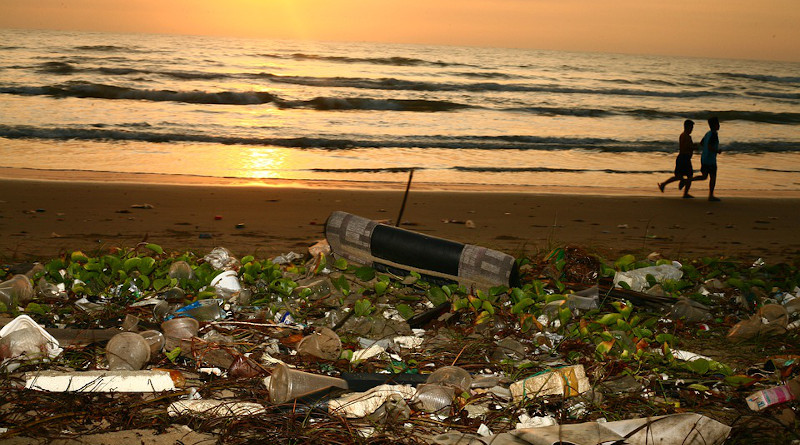Ocean Pollution Cleanup Should Be An Urgent Priority – Analysis
Pollution continues to make an ugly home for itself throughout Earth’s oceans. The mounds of plastic and junk, combined with shifting ocean currents because of global warming, are delivering waste to beaches around the world. The volume of debris is piling up, but there are efforts to contain this growing phenomenon. These are important for specific types of corporate social responsibility programs, with stakeholders needing to up their efforts, especially in the plastics industry.
Continuity in the efforts to clean up the growing amount of ocean debris needs to be achieved through an information center to coordinate the various stakeholders and participants. The industry’s help with the cleanup of ocean pollution has to be transnational in nature, building on local capacities first. If those capacities do not exist, then they need to be created. The uneven cleanup of ocean garbage results in success in one country, while neighboring countries continue to find refuse on their beaches. This type of situation needs to be addressed succinctly by policymakers and those stakeholders that are environmentally conscious. Corporate social responsibility programs must come from the plastics industry as part of its approach to protecting the world’s oceans and beaches.
The ocean ecosystem is affected in ways that engrain themselves in negative phenomena. Scientists know that ocean pollution has multiple negative impacts on marine ecosystems, and that these are exacerbated by global climate change. Petroleum-based pollutants reduce photosynthesis in marine microorganisms that generate oxygen, creating chemical imbalances. In addition, the bleaching process of coral is expanding worldwide, killing off parts of vital local aquatic ecosystems. The increasing absorption of carbon dioxide into the seas causes ocean acidification, which destroys coral reefs, impairs shellfish development, dissolves calcium-containing microorganisms at the bottom of the marine food chain and increases the toxicity of some pollutants.
Scientists are examining ocean waste and climate change across the world. Islands serve as the best laboratories to study the impacts of ocean pollution and climate change because of their unique flora and fauna and their coastlines. It is argued that multiple anthropogenic stressors have threatened the Galapagos Islands. These include widespread marine pollution, such as oil spills, persistent organic pollutants, metals and ocean plastic pollution.
The impact on the health of Galapagos species is notable. Sea pollution and climate change challenge the global fishing industry. Research shows that illegal, unreported and unregulated fishing reshapes the composition and structure of endemic and native Galapagos wildlife and aquatic communities. It is important to consider marine pollution factors, in combination with climate change impacts, when assessing the evolutionary fitness of species.
Applying the Galapagos model to other locations is necessary, but the findings are problematic due to uneven or insufficient stakeholder and corporate efforts. By understanding the fitness of species that inhabit a particular location that is subject to excess marine pollution from climate change, it is possible to test local ecosystems for their ability to heal. Human intervention is necessary but is never enough, hence the turning of the tide regarding better cleanup efforts.
Plastic pollution threatens marine mammals, fish and seabirds and accumulates in large mid-ocean gyres. Plastics break down into microplastic and nanoplastic particles containing multiple manufactured chemicals that can enter the tissues of marine organisms, including species consumed by humans. Industrial releases, runoffs and sewage increase bacterial pollution and antimicrobial resistance. Pollution and sea surface warming are triggering the poleward migration of dangerous pathogens such as the Vibrio species. And industrial discharge, pharmaceutical waste, pesticides and sewage contribute to global declines in fish stocks. It may be up to the plastics industry to engage more heavily in helping to clean up oceans and beaches, while improving environmental concerns as climate change occurs.
The actual content of the pollution in the oceans is brought together in large patches by currents, sometimes creating a toxic mix. Marine scientists have found concentrations of the chemical compound known as DDT, which affects reproductive systems. Ocean warming events such as El Nino also cause nutritional stress for animals. Climate change may increase their vulnerability to the impacts of pollutants, resulting in some species reaching their population tipping point. Marine plastics are undoubtedly emerging as a widespread threat to aquatic and seashore species. Humans swim in and consume seafood from these toxic patches of seawater.
Significantly, countries with poor waste infrastructure also contribute to the problem. In fact, more than half of all land-based plastic waste that entered the ocean in the early 2010s came from five countries in Southeast Asia. Now, the phenomenon is more widespread.
Many industries that have a maritime aspect to their business are attempting to help clean up this mess. The focus on the plastics industry is important because such stakeholders recognize that marine debris is a global issue. The plastics industry is collaborating with associations and entities worldwide to provide education, tools and resources to build and improve waste infrastructure, plastics recycling and the removal of marine debris.
There is even the Declaration of the Global Plastics Associations for Solutions on Marine Litter, which is an industry-wide commitment to reduce ocean pollution. However, this type of effort needs radical updating and corporate social responsibility departments should up their game and use a cross-corporate communication and strategy approach. As usual, all efforts should have started yesterday.

